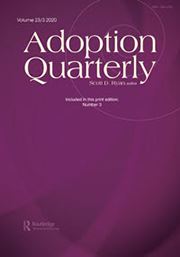 Congratulations to Assistant Professor of Psychology Kristina Howansky who was recently published in the journal Teaching of Psychology!
Congratulations to Assistant Professor of Psychology Kristina Howansky who was recently published in the journal Teaching of Psychology!
Uncover the science behind the mind.
 Congratulations to Assistant Professor of Psychology Kristina Howansky who was recently published in the journal Teaching of Psychology!
Congratulations to Assistant Professor of Psychology Kristina Howansky who was recently published in the journal Teaching of Psychology!
 Congratulations to Visiting Assistant Professor Cjersti Jensen and collaborators who recently published an article titled “Examination of ethnic racial identity exploration and commitment in emerging adults: Group comparisons and specific features of multiracial identity” in Journal of American College Health!
Congratulations to Visiting Assistant Professor Cjersti Jensen and collaborators who recently published an article titled “Examination of ethnic racial identity exploration and commitment in emerging adults: Group comparisons and specific features of multiracial identity” in Journal of American College Health!To better understand differences in Monoracial White, Monoracial Minoritized, and Multiracial college students, 888 emerging adults were surveyed. Results indicated that Multiracial participants were significantly different than the other two groups in ethnic identity exploration and experienced discrimination (with Monoracial White participants showing the lowest levels, Monoracial Minoritized participants showing the highest). Multiracial participants did not differ significantly in ethnic identity commitment from Monoracial White participants, but both groups were significantly lower in commitment than Monoracial Minoritized participants. Because Multiracial college students are poorly represented in the literature, Jensen and her collaborators also explored some variables specific to having multiple racial identities. Multiracial participants’ ethnic identity commitment, a variable related to positive psychosocial outcomes in previous research, showed a significant positive relationship with both ethnic identity exploration and a negative relationship with conflict between identities. This research highlights the differences between Monoracial and Multiracial people, and makes a strong case for people working with Multiracial college students to consider their unique challenges and experiences.
 Congratulations to Assistant Professor of Psychology Kristina Howansky and collaborators who recently published “Identity safety cues predict instructor impressions, belonging, and absences in the psychology classroom” in the journal Teaching of Psychology!
Congratulations to Assistant Professor of Psychology Kristina Howansky and collaborators who recently published “Identity safety cues predict instructor impressions, belonging, and absences in the psychology classroom” in the journal Teaching of Psychology!
Howansky, K., Maimon, M., & Sanchez, D. (2021). Identity safety cues predict instructor impressions, belonging, and absences in the psychology classroom. Teaching of Psychology, https://doi.org/10.1177/0098628321990362
This work aimed to explore some of the possible benefits of identity safety cues – signals to let students’ know diverse identities are valued in their classroom – in the higher-ed classroom. Researchers found that identify safety cues were associated with more positive impressions of students’ professor, a higher sense of belonging in the class, and even fewer absences. Although the safety cues were aimed at specific populations, they were associated with positive outcomes across student identities, even those not specifically targeted by the cues. Provided in the article are concrete examples and small steps faculty can make to signal their values of inclusion to students.
You can read the abstract here.
The acknowledgements section of the paper includes a shoutout to psychology department members Assistant Professor Gili Freedman, Assistant Professor Ayse Ikizler, and Associate Professor Scott Mirabile for their feedback on the manuscript. It also gives thanks to psychology majors Gabrielle Backus, Jannah Mawuli, and India Oates.
 Congratulations to Visiting Associate Professor of Psychology Brian Sharpless who recently published an article in the Journal of Sleep Research with two colleagues from Charles University and the National Institute of Mental Health (NUDZ) in the Czech Republic! The article, “Could Sleep Paralysis be Pleasant?” was a quantitative study of the prevalence and associated features of sleep paralysis episodes.
Congratulations to Visiting Associate Professor of Psychology Brian Sharpless who recently published an article in the Journal of Sleep Research with two colleagues from Charles University and the National Institute of Mental Health (NUDZ) in the Czech Republic! The article, “Could Sleep Paralysis be Pleasant?” was a quantitative study of the prevalence and associated features of sleep paralysis episodes.
 Congratulations to Professor of Psychology Libby Nutt Williams and alums Meg Marcelli ‘17, Ben Ertman ‘18, and Kelly Culotta ‘18 who recently published an article in the journal Adoption Quarterly!
Congratulations to Professor of Psychology Libby Nutt Williams and alums Meg Marcelli ‘17, Ben Ertman ‘18, and Kelly Culotta ‘18 who recently published an article in the journal Adoption Quarterly!
Marcelli, M., Williams, E. N., Culotta, K. & Ertman, B. (2020). The Impact of Racial-Ethnic Socialization Practices on International Transracial Adoptee Identity Development, Adoption Quarterly, DOI: 10.1080/10926755.2020.1833393
The article is based on Marcelli’s SMP which was a qualitative study that explored adoptees’ perspectives on their parents’ socialization strategies and the effect of those practices on their sense of identity and ability to manage future challenges, such as racial discrimination. Marcelli was scheduled to present the research at the Annual Meeting of the National Association of Social Workers Conference in June 2020, but the conference was unfortunately cancelled due to COVID-19.

Congratulations to Dr. Brian A. Sharpless, Visiting Associate Professor of Psychology, who recently published an article in the journal Sleep Medicine with several colleagues from the US and the UK. The article, “Exploding Head Syndrome: Clinical Features, Theories about Etiology, and Prevention Strategies in a Large International Sample”, was based on data from over 6,000 participants. It was carried out through the British Broadcasting Corporation’s Science Focus Magazine.
Exploding head syndrome (EHS) is a sleep disorder (i.e., parasomnia) characterized by the perception of loud noises or a sense of explosion in the head during sleep transitions. Though first identified in 1876, it has received relatively little scientific attention and no well-established treatment options are yet available for sufferers.
Results of this study indicated that those with EHS had poorer and shorter sleep than those without EHS. Not surprisingly, episodes of EHS were associated with clinically significant levels of fear, but only 25% of experienced significant distress as a result of episodes whereas only 10% reported significant life interference. The majority of sufferers believed EHS to be a natural, brain-based phenomenon, but 2.3% blamed electronic equipment and 2.8% believed that was due to supernatural causes. Finally, five effective prevention strategies were identified from the first-hand reports of sufferers. Several of these were consistent with existing treatment approaches for insomnia and anxiety and may prove useful for developing a novel treatment for chronic EHS.
On July 15, 2020, Sharpless was interviewed by Newsweek in regards to the study.
 Congratulations to Dr. Libby Williams on her recent publication with alumna, Emily Morgan ’18!
Congratulations to Dr. Libby Williams on her recent publication with alumna, Emily Morgan ’18!
Morgan, E., & Nutt Williams, E. (2020). A qualitative study of psychotherapists’ in-session tears. Psychotherapy. Advance online publication. https://doi.org/10.1037/pst0000298
The article, which is based on Emily’s SMP, examines the impact of therapists’ crying during counseling sessions from the point of view of the therapist. Morgan ’18 and Williams are also scheduled to present their work at the annual convention of the American Psychological Association in August.
 Congratulations to Dr. Libby Williams on her recent publication!
Congratulations to Dr. Libby Williams on her recent publication!
Williams. E. N. (2020). Research with underserved populations: Matching method to need. In J. Zimmerman, J. Barnett, & L. Campbell (Eds.), Bringing psychotherapy to the underserved: Challenges and strategies. New York: Oxford University Press.
Here is the abstract for the book chapter:
“The research findings to date are clear: health disparities exist and are persistent. This chapter explores current research strategies and considers additional, less often employed methodologies in the area of mental health disparities. In particular, previous correlational and survey studies examining barriers to treatment are reviewed. In addition to understanding barriers to treatment, however, we need to focus on what works for underserved populations. Additional experimental studies of treatment modalities (e.g., tele-health), the impact of integrated care and geographic access, and the use of cultural and language-sensitive programs seem timely. Additional qualitative studies of individual experiences within various underserved populations will also help us devise innovative treatment approaches. By matching method to need, we will be able to find new ways to help underserved populations decide to seek help, access the care they need, and receive the best psychotherapeutic treatments available.”
Congratulations to Dr. Gili Freedman on her recent publication!
Freedman, G., Brandler, S. & Beer, J. S. (2019). Does engaging in social rejection heighten or diminish social processing? Comprehensive Results in Social Psychology, DOI: 10.1080/23743603.2019.1684820
Engaging in social rejection can lead to feeling both increased social power and decreased belongingness. Yet, social power is associated with diminished social sensitivity, whereas threatened belongingness can enhance social sensitivity. In a registered report, Freedman and coauthors tested these competing hypotheses of how engaging in social rejection may affect social sensitivity. Contrary to the competing hypotheses tested, they did not find evidence that social rejection, compared to social acceptance, led to increased or decreased social sensitivity. An exploratory analysis found that men who engaged in rejection showed decreased social sensitivity compared to men who did not engage in rejection.